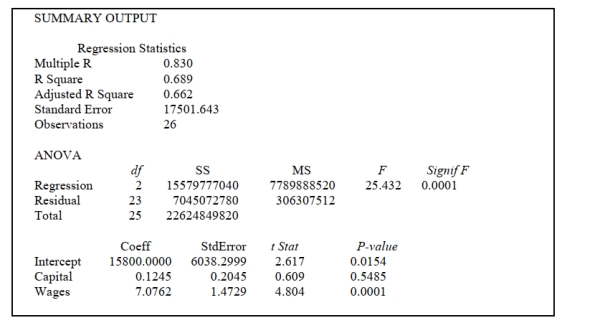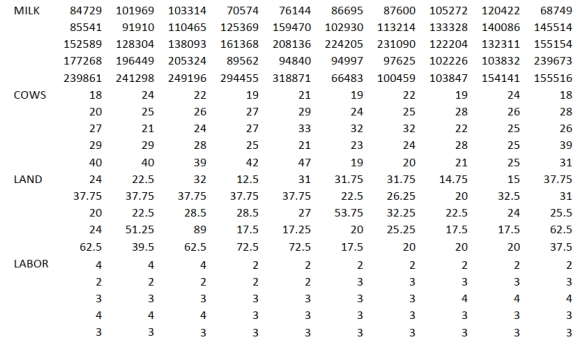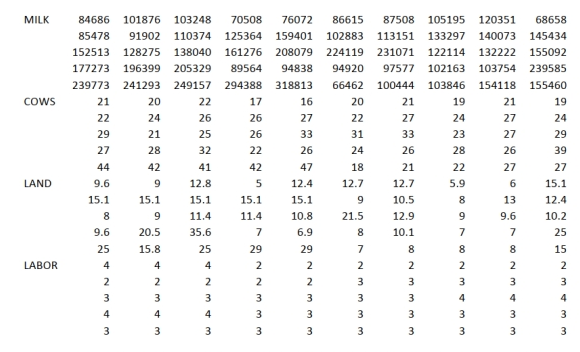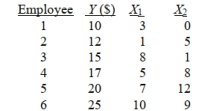Exam 14: Introduction to Multiple
Exam 1: Defining and Collecting Data202 Questions
Exam 2: Organizing and Visualizing256 Questions
Exam 3: Numerical Descriptive Measures217 Questions
Exam 4: Basic Probability167 Questions
Exam 5: Discrete Probability Distributions165 Questions
Exam 6: The Normal Distribution and Other Continuous Distributions170 Questions
Exam 7: Sampling Distributions165 Questions
Exam 8: Confidence Interval Estimation219 Questions
Exam 9: Fundamentals of Hypothesis Testing: One-Sample Tests194 Questions
Exam 10: Two-Sample Tests240 Questions
Exam 11: Analysis of Variance170 Questions
Exam 12: Chi-Square and Nonparametric188 Questions
Exam 13: Simple Linear Regression243 Questions
Exam 14: Introduction to Multiple394 Questions
Exam 15: Multiple Regression146 Questions
Exam 16: Time-Series Forecasting235 Questions
Exam 17: Getting Ready to Analyze Data386 Questions
Exam 18: Statistical Applications in Quality Management159 Questions
Exam 19: Decision Making126 Questions
Exam 20: Probability and Combinatorics421 Questions
Select questions type
SCENARIO 14-5
A microeconomist wants to determine how corporate sales are influenced by capital and wage
spending by companies. She proceeds to randomly select 26 large corporations and record
information in millions of dollars. The Microsoft Excel output below shows results of this multiple
regression.  -Referring to Scenario 14-5, what is the p-value for Capital?
-Referring to Scenario 14-5, what is the p-value for Capital?
(Multiple Choice)
4.8/5  (43)
(43)
SCENARIO 14-12 As a project for his business statistics class, a student examined the factors that determined parking meter rates throughout the campus area. Data were collected for the price (\$) per hour of parking, blocks to the quadrangle, and whether the parking is on or off campus. The population regression model hypothesized is
where
is the meter price per hour
is the number of blocks to the quad
is a dummy variable that takes the value 1 if the meter is located on campus and 0 otherwise
The following Excel results are obtained.
Regression Statistics Multiple R 0.5536 R Square 0.3064 Adjusted R Square 0.2812 Standard Error 0.4492 Observations 58
ANOVA
df SS MS F Significance F Regression 2 4.9035 2.4518 12.1501 0.0000 Residual 55 11.0984 0.2018 Total 57 16.0019
Coefficients Standard Error Stat P-value Lower 99\% Upper 99\% Intercept 1.6500 0.2028 8.1359 0.0000 1.1089 2.1912 Block -0.2504 0.0529 -4.7355 0.0000 -0.3915 -0.1093 Campus 0.1552 0.1297 1.1966 0.2366 -0.1908 0.5011
-Referring to Scenario 14-12, predict the cost per hour if one parks off campus and 3 blocks
from the quad.
(Short Answer)
4.8/5  (33)
(33)
SCENARIO 14-5
A microeconomist wants to determine how corporate sales are influenced by capital and wage
spending by companies. She proceeds to randomly select 26 large corporations and record
information in millions of dollars. The Microsoft Excel output below shows results of this multiple
regression.  -Referring to Scenario 14-5, one company in the sample had sales of $20 billion (Sales = 20,000). This company spent $300 million on capital and $700 million on wages. What is the residual (in
Millions of dollars) for this data point?
-Referring to Scenario 14-5, one company in the sample had sales of $20 billion (Sales = 20,000). This company spent $300 million on capital and $700 million on wages. What is the residual (in
Millions of dollars) for this data point?
(Multiple Choice)
4.9/5  (30)
(30)
SCENARIO 14-20-A
You are the CEO of a dairy company. You are planning to expand milk production by purchasing
additional cows, lands and hiring more workers. From the existing 50 farms owned by the company,
you have collected data on total milk production (in liters), the number of milking cows, land size (in
acres) and the number of laborers. The data are shown below and also available in the Excel file
Scenario14-20-DataA.XLSX.
S  You believe that the number of milking cows , land size and the number of laborers are the best predictors for total milk production on any given farm.
-Referring to Scenario 14-20-A, the null hypothesis should be rejected at a 10%
level of significance when testing whether the number of milking cows has any effect on the total
milk production while holding constant the effect of the other independent variables.
You believe that the number of milking cows , land size and the number of laborers are the best predictors for total milk production on any given farm.
-Referring to Scenario 14-20-A, the null hypothesis should be rejected at a 10%
level of significance when testing whether the number of milking cows has any effect on the total
milk production while holding constant the effect of the other independent variables.
(True/False)
4.8/5  (30)
(30)
In calculating the standard error of the estimate, degrees of freedom, where n is the sample size and k represents the number of independent
variables in the model.
(True/False)
4.8/5  (19)
(19)
SCENARIO 14-20-B
You are the CEO of a dairy company. You are planning to expand milk production by purchasing
additional cows, lands and hiring more workers. From the existing 50 farms owned by the company,
you have collected data on total milk production (in liters), the number of milking cows, land size (in
acres) and the number of laborers. The data are shown below and also available in the Excel file
Scenario14-20-DataB.XLSX.
MILK 84686 101876 103248 70508 76072 86615 87508 105195 120351 68658  You believe that the number of milking cows , land size and the number of laborers are the best predictors for total milk production on any given farm.
-Referring to Scenario 14-20-B, there is sufficient evidence that the number of
laborers has an effect on the total milk production while holding constant the effect of the other
independent variables at a 10% level of significance.
You believe that the number of milking cows , land size and the number of laborers are the best predictors for total milk production on any given farm.
-Referring to Scenario 14-20-B, there is sufficient evidence that the number of
laborers has an effect on the total milk production while holding constant the effect of the other
independent variables at a 10% level of significance.
(True/False)
4.8/5  (22)
(22)
SCENARIO 14-17
Given below are results from the regression analysis where the dependent variable is the number of
weeks a worker is unemployed due to a layoff (Unemploy) and the independent variables are the age
of the worker (Age) and a dummy variable for management position (Manager: 1 = yes, 0 = no).
The results of the regression analysis are given below: \ Regression Statistics Multiple R 0.6391 R Square 0.4085 Adjusted R Square 0.3765 Standard Error 18.8929 Observations 40
 Coefficients Standard Error t Stat P-value Intercept -0.2143 11.5796 -0.0185 0.9853 Age 1.4448 0.3160 4.5717 0.0000 Manager -22.5761 11.3488 -1.9893 0.0541
-Referring to Scenario 14-17, what is the p-value of the test statistic to determine whether there
is a significant relationship between the number of weeks a worker is unemployed due to a layoff
and the entire set of explanatory variables?
Coefficients Standard Error t Stat P-value Intercept -0.2143 11.5796 -0.0185 0.9853 Age 1.4448 0.3160 4.5717 0.0000 Manager -22.5761 11.3488 -1.9893 0.0541
-Referring to Scenario 14-17, what is the p-value of the test statistic to determine whether there
is a significant relationship between the number of weeks a worker is unemployed due to a layoff
and the entire set of explanatory variables?
(Short Answer)
4.7/5  (40)
(40)
SCENARIO 14-17
Given below are results from the regression analysis where the dependent variable is the number of
weeks a worker is unemployed due to a layoff (Unemploy) and the independent variables are the age
of the worker (Age) and a dummy variable for management position (Manager: 1 = yes, 0 = no).
The results of the regression analysis are given below: \ Regression Statistics Multiple R 0.6391 R Square 0.4085 Adjusted R Square 0.3765 Standard Error 18.8929 Observations 40
 Coefficients Standard Error t Stat P-value Intercept -0.2143 11.5796 -0.0185 0.9853 Age 1.4448 0.3160 4.5717 0.0000 Manager -22.5761 11.3488 -1.9893 0.0541
-Referring to Scenario 14-17, we can conclude definitively that, holding constant
the effect of the other independent variables, there is not a difference in the mean number of
weeks a worker is unemployed due to a layoff between a worker who is in a management position
and one who is not at a 10% level of significance if all we have is the information of the 95%
confidence interval estimate for the difference in the mean number of weeks a worker is
unemployed due to a layoff between a worker who is in a management position and one who is
not.
Coefficients Standard Error t Stat P-value Intercept -0.2143 11.5796 -0.0185 0.9853 Age 1.4448 0.3160 4.5717 0.0000 Manager -22.5761 11.3488 -1.9893 0.0541
-Referring to Scenario 14-17, we can conclude definitively that, holding constant
the effect of the other independent variables, there is not a difference in the mean number of
weeks a worker is unemployed due to a layoff between a worker who is in a management position
and one who is not at a 10% level of significance if all we have is the information of the 95%
confidence interval estimate for the difference in the mean number of weeks a worker is
unemployed due to a layoff between a worker who is in a management position and one who is
not.
(True/False)
4.8/5  (33)
(33)
SCENARIO 14-18
A logistic regression model was estimated in order to predict the probability that a randomly chosen
university or college would be a private university using information on mean total Scholastic
Aptitude Test score (SAT) at the university or college and whether the TOEFL criterion is at least 90
(Toefl90 = 1 if yes, 0 otherwise.) The dependent variable, Y, is school type (Type = 1 if private and
0 otherwise).
The PHStat output is given below:
Binary Logistic Regression Predictor Coefficients SE Coef Z p -Value Intercept -3.9594 1.6741 -2.3650 0.0180 SAT 0.0028 0.0011 2.5459 0.0109 Toefl90:1 0.1928 0.5827 0.3309 0.7407 Deviance 101.9826
-Referring to Scenario 14-18, what is the p-value of the test statistic when testing whether SAT
makes a significant contribution to the model in the presence of Toefl90?
(Short Answer)
5.0/5  (30)
(30)
SCENARIO 14-11
A weight-loss clinic wants to use regression analysis to build a model for weight loss of a client
(measured in pounds). Two variables thought to affect weight loss are client's length of time on the
weight-loss program and time of session. These variables are described below: Weight loss (in pounds)
Length of time in weight-loss program (in months)
if morning session, 0 if not
Data for 25 clients on a weight-loss program at the clinic were collected and used to fit the interaction model:
Regression Statistics Multiple R 0.7308 R Square 0.5341 Adjusted R Square 0.4675 Standard Error 43.3275 Observations 25
 Coefficients Standard Error t Stot Lower 99\% Upper 99\% Intercept -20.7298 22.3710 -0.9266 0.3646 -84.0702 42.6106 Length 7.2472 1.4992 4.8340 0.0001 3.0024 11.4919 Morn 90.1981 40.2336 2.2419 0.0359 -23.7176 204.1138 Length × Morn -5.1024 3.3511 -1.5226 0.1428 -14.5905 4.3857
-Referring to Scenario 14-11, the overall model for predicting weight loss (Y) is
statistically significant at the 0.05 level.
Coefficients Standard Error t Stot Lower 99\% Upper 99\% Intercept -20.7298 22.3710 -0.9266 0.3646 -84.0702 42.6106 Length 7.2472 1.4992 4.8340 0.0001 3.0024 11.4919 Morn 90.1981 40.2336 2.2419 0.0359 -23.7176 204.1138 Length × Morn -5.1024 3.3511 -1.5226 0.1428 -14.5905 4.3857
-Referring to Scenario 14-11, the overall model for predicting weight loss (Y) is
statistically significant at the 0.05 level.
(True/False)
4.7/5  (36)
(36)
SCENARIO 14-5
A microeconomist wants to determine how corporate sales are influenced by capital and wage
spending by companies. She proceeds to randomly select 26 large corporations and record
information in millions of dollars. The Microsoft Excel output below shows results of this multiple
regression.  -Referring to Scenario 14-5, what is the p-value for testing whether Capital has a positive influence on corporate sales?
-Referring to Scenario 14-5, what is the p-value for testing whether Capital has a positive influence on corporate sales?
(Multiple Choice)
4.9/5  (33)
(33)
SCENARIO 14-17
Given below are results from the regression analysis where the dependent variable is the number of
weeks a worker is unemployed due to a layoff (Unemploy) and the independent variables are the age
of the worker (Age) and a dummy variable for management position (Manager: 1 = yes, 0 = no).
The results of the regression analysis are given below: \ Regression Statistics Multiple R 0.6391 R Square 0.4085 Adjusted R Square 0.3765 Standard Error 18.8929 Observations 40
 Coefficients Standard Error t Stat P-value Intercept -0.2143 11.5796 -0.0185 0.9853 Age 1.4448 0.3160 4.5717 0.0000 Manager -22.5761 11.3488 -1.9893 0.0541
-Referring to Scenario 14-17, the alternative hypothesis implies that the number of weeks a worker is unemployed due to a layoff is related to all of the
explanatory variables.
Coefficients Standard Error t Stat P-value Intercept -0.2143 11.5796 -0.0185 0.9853 Age 1.4448 0.3160 4.5717 0.0000 Manager -22.5761 11.3488 -1.9893 0.0541
-Referring to Scenario 14-17, the alternative hypothesis implies that the number of weeks a worker is unemployed due to a layoff is related to all of the
explanatory variables.
(True/False)
4.8/5  (40)
(40)
SCENARIO 14-2 A professor of industrial relations believes that an individual's wage rate at a factory depends on his performance rating and the number of economics courses the employee successfully completed in college . The professor randomly selects 6 workers and collects the following information:
 -Referring to Scenario 14-2, for these data, what is the estimated coefficient for performance rating, b1?
-Referring to Scenario 14-2, for these data, what is the estimated coefficient for performance rating, b1?
(Multiple Choice)
4.8/5  (37)
(37)
SCENARIO 14-13
An econometrician is interested in evaluating the relationship of demand for building materials to
mortgage rates in Los Angeles and San Francisco. He believes that the appropriate model is
where
where = mortgage rate in \% =1 if SF, 0 if LA Y= demand in \ 100 per capita
-Referring to Scenario 14-13, the predicted demand in San Francisco when the mortgage rate is
10% is ________.
(Short Answer)
4.7/5  (33)
(33)
SCENARIO 14-15
The superintendent of a school district wanted to predict the percentage of students passing a sixth-
grade proficiency test. She obtained the data on percentage of students passing the proficiency test
(% Passing), mean teacher salary in thousands of dollars (Salaries), and instructional spending per
pupil in thousands of dollars (Spending) of 47 schools in the state. Following is the multiple regression output with Passing as the dependent variable,
Salaries and Spending:
Regression Statistics Multiple R 0.4276 R Square 0.1828 Adjusted R Square 0.1457 Standard Error 5.7351 Observations 47
ANOVA
 Coefficients Standard Error t Stat \rho -value Lower 95\% Upper 95\% Intercept -72.9916 45.9106 -1.5899 0.1190 -165.5184 19.5352 Salary 2.7939 0.8974 3.1133 0.0032 0.9853 4.6025 Spending 0.3742 0.9782 0.3825 0.7039 -1.5972 2.3455
-Referring to Scenario 14-15, which of the following is the correct alternative hypothesis to test whether instructional spending per pupil has any effect on percentage of students passing the
Proficiency test, taking into account the effect of mean teacher salary? a)
b)
c)
d)
Coefficients Standard Error t Stat \rho -value Lower 95\% Upper 95\% Intercept -72.9916 45.9106 -1.5899 0.1190 -165.5184 19.5352 Salary 2.7939 0.8974 3.1133 0.0032 0.9853 4.6025 Spending 0.3742 0.9782 0.3825 0.7039 -1.5972 2.3455
-Referring to Scenario 14-15, which of the following is the correct alternative hypothesis to test whether instructional spending per pupil has any effect on percentage of students passing the
Proficiency test, taking into account the effect of mean teacher salary? a)
b)
c)
d)
(Short Answer)
4.7/5  (38)
(38)
SCENARIO 14-18
A logistic regression model was estimated in order to predict the probability that a randomly chosen
university or college would be a private university using information on mean total Scholastic
Aptitude Test score (SAT) at the university or college and whether the TOEFL criterion is at least 90
(Toefl90 = 1 if yes, 0 otherwise.) The dependent variable, Y, is school type (Type = 1 if private and
0 otherwise).
The PHStat output is given below:
Binary Logistic Regression Predictor Coefficients SE Coef Z p -Value Intercept -3.9594 1.6741 -2.3650 0.0180 SAT 0.0028 0.0011 2.5459 0.0109 Toefl90:1 0.1928 0.5827 0.3309 0.7407 Deviance 101.9826
-Referring to Scenario 14-18, there is not enough evidence to conclude that SAT
score makes a significant contribution to the model in the presence of Toefl90 at a 0.05 level of
significance.
(True/False)
4.7/5  (31)
(31)
SCENARIO 14-15
The superintendent of a school district wanted to predict the percentage of students passing a sixth-
grade proficiency test. She obtained the data on percentage of students passing the proficiency test
(% Passing), mean teacher salary in thousands of dollars (Salaries), and instructional spending per
pupil in thousands of dollars (Spending) of 47 schools in the state. Following is the multiple regression output with Passing as the dependent variable,
Salaries and Spending:
Regression Statistics Multiple R 0.4276 R Square 0.1828 Adjusted R Square 0.1457 Standard Error 5.7351 Observations 47
ANOVA
 Coefficients Standard Error t Stat \rho -value Lower 95\% Upper 95\% Intercept -72.9916 45.9106 -1.5899 0.1190 -165.5184 19.5352 Salary 2.7939 0.8974 3.1133 0.0032 0.9853 4.6025 Spending 0.3742 0.9782 0.3825 0.7039 -1.5972 2.3455
-Referring to Scenario 14-15, what is the value of the test statistic when testing whether mean
teacher salary has any effect on percentage of students passing the proficiency test, taking into
account the effect of instructional spending per pupil?
Coefficients Standard Error t Stat \rho -value Lower 95\% Upper 95\% Intercept -72.9916 45.9106 -1.5899 0.1190 -165.5184 19.5352 Salary 2.7939 0.8974 3.1133 0.0032 0.9853 4.6025 Spending 0.3742 0.9782 0.3825 0.7039 -1.5972 2.3455
-Referring to Scenario 14-15, what is the value of the test statistic when testing whether mean
teacher salary has any effect on percentage of students passing the proficiency test, taking into
account the effect of instructional spending per pupil?
(Short Answer)
5.0/5  (32)
(32)
Consider a regression in which and the standard error of this
coefficient equals 0.3. To determine whether is a significant explanatory variable, you would
compute an observed t-value of - 5.0.
(True/False)
4.8/5  (42)
(42)
SCENARIO 14-20-B
You are the CEO of a dairy company. You are planning to expand milk production by purchasing
additional cows, lands and hiring more workers. From the existing 50 farms owned by the company,
you have collected data on total milk production (in liters), the number of milking cows, land size (in
acres) and the number of laborers. The data are shown below and also available in the Excel file
Scenario14-20-DataB.XLSX.
MILK 84686 101876 103248 70508 76072 86615 87508 105195 120351 68658  You believe that the number of milking cows , land size and the number of laborers are the best predictors for total milk production on any given farm.
-Referring to Scenario 14-20-B, what are the lower and upper limits of the 95% confidence
interval estimate for the change in mean total milk production as a result of adding one more
laborer after taking into consideration the effect of all the other independent variables?
You believe that the number of milking cows , land size and the number of laborers are the best predictors for total milk production on any given farm.
-Referring to Scenario 14-20-B, what are the lower and upper limits of the 95% confidence
interval estimate for the change in mean total milk production as a result of adding one more
laborer after taking into consideration the effect of all the other independent variables?
(Short Answer)
4.9/5  (24)
(24)
SCENARIO 14-15
The superintendent of a school district wanted to predict the percentage of students passing a sixth-
grade proficiency test. She obtained the data on percentage of students passing the proficiency test
(% Passing), mean teacher salary in thousands of dollars (Salaries), and instructional spending per
pupil in thousands of dollars (Spending) of 47 schools in the state. Following is the multiple regression output with Passing as the dependent variable,
Salaries and Spending:
Regression Statistics Multiple R 0.4276 R Square 0.1828 Adjusted R Square 0.1457 Standard Error 5.7351 Observations 47
ANOVA
 Coefficients Standard Error t Stat \rho -value Lower 95\% Upper 95\% Intercept -72.9916 45.9106 -1.5899 0.1190 -165.5184 19.5352 Salary 2.7939 0.8974 3.1133 0.0032 0.9853 4.6025 Spending 0.3742 0.9782 0.3825 0.7039 -1.5972 2.3455
-Referring to Scenario 14-15, predict the percentage of students passing the proficiency test for a
school which has a mean teacher salary of 40,000 dollars, and an instructional spending per pupil
of 2,000 dollars.
Coefficients Standard Error t Stat \rho -value Lower 95\% Upper 95\% Intercept -72.9916 45.9106 -1.5899 0.1190 -165.5184 19.5352 Salary 2.7939 0.8974 3.1133 0.0032 0.9853 4.6025 Spending 0.3742 0.9782 0.3825 0.7039 -1.5972 2.3455
-Referring to Scenario 14-15, predict the percentage of students passing the proficiency test for a
school which has a mean teacher salary of 40,000 dollars, and an instructional spending per pupil
of 2,000 dollars.
(Short Answer)
4.9/5  (34)
(34)
Showing 101 - 120 of 394
Filters
- Essay(0)
- Multiple Choice(0)
- Short Answer(0)
- True False(0)
- Matching(0)